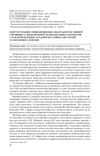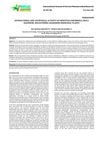 81 citations,
April 2009 in “Journal of Investigative Dermatology”
81 citations,
April 2009 in “Journal of Investigative Dermatology” Hair shedding is an active process that could be targeted to treat hair loss.
 17 citations,
December 2015 in “International Journal of Cosmetic Science”
17 citations,
December 2015 in “International Journal of Cosmetic Science” Visible light can improve skin disorders and hair loss, but more research is needed to understand long-term effects.
241 citations,
August 2005 in “Journal of Investigative Dermatology Symposium Proceedings” Dandruff and seborrheic dermatitis are caused by yeast feeding on scalp oils, leading to irritation and flaking.
 88 citations,
June 2016 in “Human Reproduction Update”
88 citations,
June 2016 in “Human Reproduction Update” New hormonal contraceptives are safer, have fewer side effects, and offer health benefits for women.
 14 citations,
January 2015 in “Clinical Nutrition Research”
14 citations,
January 2015 in “Clinical Nutrition Research” MK-R7 supplement with Cistanche Tubulosa and Laminaria Japonica extracts improved hair density and scalp health without adverse effects.
 9 citations,
January 1997 in “Gynecological Endocrinology”
9 citations,
January 1997 in “Gynecological Endocrinology” The document concludes that treating androgen excess needs patience, managing expectations is important, and many drugs used are not officially approved, suggesting cosmetic options for mild cases.
 5 citations,
January 2018 in “Springer eBooks”
5 citations,
January 2018 in “Springer eBooks” Acne in dark skin is influenced by environmental factors and can lead to hyperpigmentation, with various treatment options available.
 2 citations,
December 2004 in “Medicine”
2 citations,
December 2004 in “Medicine” Different hair and scalp disorders cause hair loss or excess hair growth, with various treatments available depending on the specific condition.
1 citations,
April 2022 in “Journal of Ayurveda and integrative medicine” Blumea eriantha DC extract shows strong potential for promoting hair growth.
 1 citations,
January 2018 in “Acta dermatovenerologica Alpina, Pannonica et Adriatica (Tiskana izd.)”
1 citations,
January 2018 in “Acta dermatovenerologica Alpina, Pannonica et Adriatica (Tiskana izd.)” The herbal extract was found to effectively reduce and prevent hair loss without any side effects.
 18 citations,
January 2013 in “Postepy Dermatologii I Alergologii”
18 citations,
January 2013 in “Postepy Dermatologii I Alergologii” Puberty often causes skin issues like acne and excessive sweating, and treatments require patience as results may vary.
 11 citations,
February 2021 in “Biomedicines”
11 citations,
February 2021 in “Biomedicines” Bacteria in our hair can affect its health and growth, and studying these bacteria could help us understand hair diseases better.
 January 2015 in “Farmatsevtychnyĭ zhurnal”
January 2015 in “Farmatsevtychnyĭ zhurnal” The tincture made from nettle, sage, and horse chestnut in a 5:3:2 ratio is effective for treating telogen effluvium.
 8 citations,
May 2017 in “Current traditional medicine”
8 citations,
May 2017 in “Current traditional medicine” Stinging nettle has compounds that help with joint pain, arthritis, and prostate issues.
 49 citations,
October 2014 in “International Scholarly Research Notices”
49 citations,
October 2014 in “International Scholarly Research Notices” Eclipta alba has many health benefits and contains compounds with potential for drug development.

False daisy is a medicinal herb with many health benefits, including hair growth promotion.
 5 citations,
September 2017 in “Plastic and Aesthetic Research”
5 citations,
September 2017 in “Plastic and Aesthetic Research” Low dose cyclical nutrition therapy can consistently and safely improve hair growth and density without needing anti-androgens.
 16 citations,
January 2010 in “Indian Journal of Dermatology, Venereology and Leprology”
16 citations,
January 2010 in “Indian Journal of Dermatology, Venereology and Leprology” Children with HIV often have skin problems that can indicate the severity of their immune system damage.
 47 citations,
March 2022 in “Frontiers in cellular and infection microbiology”
47 citations,
March 2022 in “Frontiers in cellular and infection microbiology” Changes in skin microbes play a role in some skin diseases and could lead to new treatments.
 1 citations,
July 2018 in “Elsevier eBooks”
1 citations,
July 2018 in “Elsevier eBooks” Triple horizontal scalp biopsies are 98% accurate in diagnosing hair loss, better than single biopsies.
 September 2021 in “Selçuk Üniversitesi Tıp Fakültesi dergisi”
September 2021 in “Selçuk Üniversitesi Tıp Fakültesi dergisi” People with chronic Hepatitis C often have skin problems like itching and contact dermatitis, especially older individuals and women.
 8 citations,
June 2021 in “Frontiers in Bioengineering and Biotechnology”
8 citations,
June 2021 in “Frontiers in Bioengineering and Biotechnology” Extracts from Alnus sibirica and oregonin may help with hair growth and prevent hair loss.
9 citations,
August 2021 in “International journal of molecular sciences” PPARγ is essential for maintaining healthy skin, controlling inflammation, and ensuring proper skin barrier function.
 December 2022 in “The Journal of Multidisciplinary Research”
December 2022 in “The Journal of Multidisciplinary Research” The polyherbal hair gel with guava leaves, amla, and aloe is effective for scalp health and treating fungal infections.
 92 citations,
January 1998 in “Dermatology”
92 citations,
January 1998 in “Dermatology” Ketoconazole shampoo improves hair growth and reduces oil similarly to minoxidil in male pattern hair loss.
 11 citations,
April 1990 in “Australasian Journal of Dermatology”
11 citations,
April 1990 in “Australasian Journal of Dermatology” Minoxidil modestly increases hair growth in men with early baldness and is safe to use.
 1 citations,
March 2019 in “International Journal of Current Pharmaceutical Research”
1 citations,
March 2019 in “International Journal of Current Pharmaceutical Research” The essential oils from Hedyotis corymbosa, Inula racemose, and Holostemma adakodien have significant antibacterial and antifungal properties.
 January 2012 in “Journal of Natural Remedies”
January 2012 in “Journal of Natural Remedies” The Abrus precatorius extract can effectively promote hair growth similar to standard treatments.
 16 citations,
June 2021 in “Journal of Dermatological Treatment”
16 citations,
June 2021 in “Journal of Dermatological Treatment” Minoxidil effectively treats hair loss, especially androgenetic alopecia, but needs more research for better understanding.
 12 citations,
June 2005 in “Journal of the European Academy of Dermatology and Venereology”
12 citations,
June 2005 in “Journal of the European Academy of Dermatology and Venereology” A man with HIV developed skin and hair issues after starting HIV treatment, which improved with topical treatment.



























